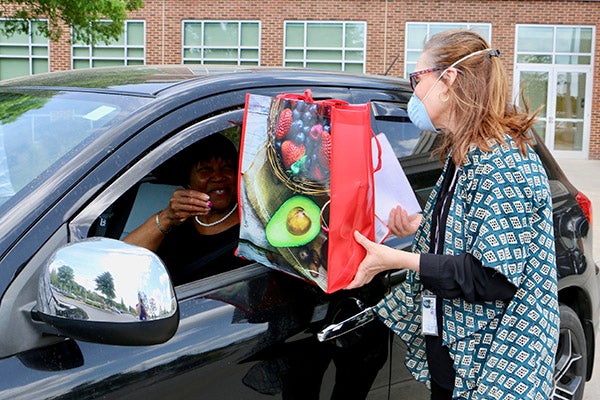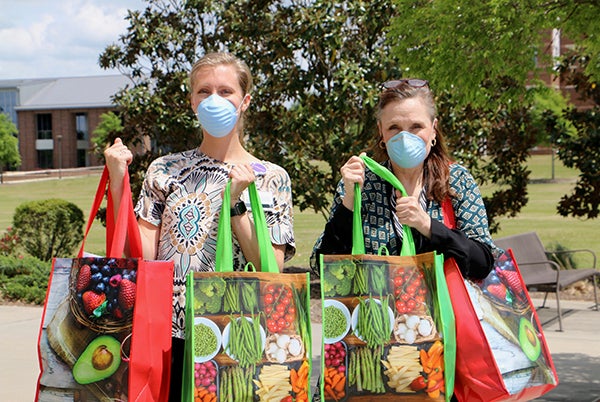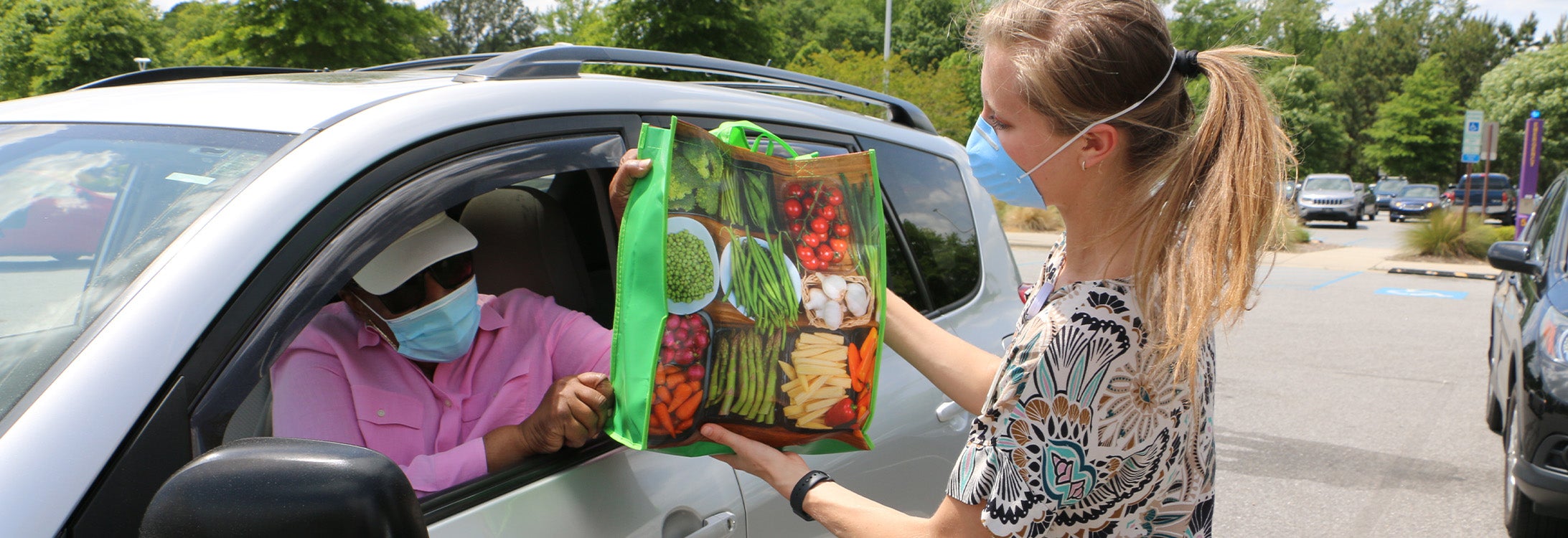VIRTUAL COOKING CLASS
ECU, community partners deliver virtual cooking class amid COVID-19 pandemic
A popular class on weight management and diabetes prevention shifted from in-person to online because of the COVID-19 pandemic—but thanks to community partnerships, participants still reaped the fruits of the course’s purpose.
Under normal circumstances, nearly 35 participants attend monthly classes at the ECU Family Medicine Center for the free program offered through East Carolina University’s Brody School of Medicine and ECU Physicians. A unique feature of the program provides participants a taste of a healthy dish—and the ingredients to take home and try out the recipe.
Because of social distancing and safety measures in place by the pandemic, program organizers had to get creative. The course delivery shifted to WebEx with relative ease. During one session, dietician nutritionists Kathleen Ascanio and Kay Craven, along with lifestyle coach Caroline Collier, demonstrate how to prepare an affordable recipe that is both delicious and healthy.

Kay Craven, director of nutrition services for ECU Physicians, gives a bag of healthy food options to Greenville resident Diana Parker as part of ECU’s weight management and diabetes prevention program.
But there was another problem—acquiring grocery store items for more than 30 people to follow the recipes, when supplies are stretched and quantities on some items are limited.
“While this is not a new grant, the new part is being unable to purchase the foods in local grocery stores as we have to have more than 30 of each item,” said Craven, director of nutrition services for ECU Physicians and section head of nutrition for ECU Family Medicine in the Brody School of Medicine. “Going to the grocery store is hit or miss.”
The NC Cooperative Extension stepped in and teamed up with local farmers who sell their produce at the Leroy James Famers Market to provide the needed ingredients for the class, including 34 dozen eggs, zucchini, onions, beets, turnips, radishes, cucumbers, strawberries, sweet potatoes, tomatoes and more than 100 pounds of cabbage. They arranged for program organizers to pick up the items on April 25, and family medicine resident physicians packed reusable grocery bags with the foods and recipes presented at the regular Wednesday class time on WebEx. The class participants picked up their supplies during a scheduled drive-through at the Family Medicine Center on April 29.
The new online class format and the teamwork that allowed the class to continue without sacrifice the benefits for participation is another example of the spirit of service and innovation on campus and in the community.
“It seems to be a win-win situation when we can support farmers and support our patients,” Craven said, adding that health-based community support has been vital to the program for years. “Vidant and the Pitt County Health Department have funded these programs for several years; both organizations are invested in our community and improving the health of our community. We have had positive results and patients have received the programs well.”
The free weight management class is supported in part by a grant from Vidant Health’s community benefits program and the Diabetes Prevention Program is supported through the Pitt County Health Department.

• Caroline Collier, left, and Kay Craven, from ECU’s Department of Family Medicine, gave out free bags of healthy food options to patients on April 29, 2020 as part of ECU’s weight management and diabetes prevention program.
Greenville resident Joy Jarvis started taking part in the program after she was diagnosed as being pre-diabetic. That was 38 pounds ago.
“This program is a major source of support and I personally enjoy the accountability factor,” Jarvis said. “The fact that we have someone to report in to on a weekly basis requires us to be consistent and accountable, to ourselves as well as the program.”
Jarvis said she thinks it would have been easy for ECU to simply suspend the program instead of finding a way to move it online.
“I totally appreciate that they didn’t. It feels like I have the support of the community – from the people involved with the program to the farmers and their contributions to our program, it has been tremendous,” Jarvis said. “I have personally benefited, so I appreciate that we have been able to continue our program via WebEx or the telephone. Because it is working.”
Greenville resident Diana Parker joined the program in 2014 and has since lost about 25 pounds. Like Jarvis, she was thrilled that the program was able to continue despite the pandemic.
“It shows that they really care for their patients and I just thank God for them. I love them and I’ve loved the staff ever since I’ve been coming here,” Parker said. “So even if I don’t lose the weight – which I did – it’s about coming here, seeing their faces and the fellowship that makes all the difference.”
The community collaboration also serves as a reminder that while coronavirus dominates headlines and alters daily life, existing health concerns are still just as important to focus on.
“Our world and our health care system has been focused on COVID-19, and for good reason,” Craven said. “However, people had health concerns before COVID-19, and these health concerns continue to be a challenge and will be when COVID-19 is over. Many individuals are stressed and may be eating more or less based on how they manage their stress. Regardless of the reason, people need support during this time. They need help with coping skills so that when we do come out of the other side of this, and we will, these patients will be in better health and ready to move forward.”
